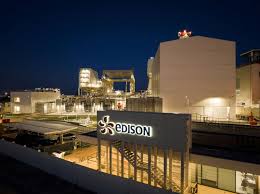Edison and Webuild sign agreement to develop hydroelectric pumping projects in Italy

Rome: Edison and Webuild have signed a programmatic agreement for the development of two hydroelectric pumping (or pumped storage) projects, which Webuild said are “highly strategic infrastructures for the ecological transition and national energy security.”
Under the agreement, Edison and Webuild will begin a close collaboration for the definition and construction of the pumping projects of Pescopagano in Basilicata and Villarosa in Sicily, developed by Edison.
The two pumping projects are part of Edison’s strategy for the growth of renewable energy in Italy, which plans to bring the group’s installed green capacity to 5 GW by 2030 (from the current 2 GW) and jointly build at least 500 MW of storage. These are necessary tools to avoid wasting renewable energy produced at times of greatest availability and to guarantee the safety of the electricity grid.
The two initiatives, in addition to the construction of new reservoirs and major engineering works underground to ensure greater compatibility with the territory, involve the use of existing reservoirs, on which interventions will be implemented aimed at restoring the full functionality of the infrastructure by increasing the safety levels and the volumes of water that can be stored, also for further public uses and to combat drought.
The Pescopagano and Villarosa projects are awaiting the conclusion of the authorization procedures at the Ministry of the Environment and Energy Security (MASE) and the concession at the respective regions. The aim is to participate in the first competitive auctions, organized by Terna, to acquire new storage capacity through long-term supply contracts, within the framework of the regulations of the Forward Storage Market (MACSE), currently being defined.
“Edison and Webuild are once again developing the Italian hydroelectric supply chain together. Thanks to this agreement, we are creating the basis for achieving the energy transition safely, limiting the country’s exposure to dependence on critical raw materials and relaunching the development of a highly strategic supply chain, of which we are champions in Europe, with clear benefits for national economic development and the increase in renewable energy on the grid, in line with decarbonization objectives,” said Nicola Monti, Edison chief executive officer .
The Italian hydroelectric supply chain, to which pumping is attributable, plays a strategic role both in terms of energy autonomy and of related industries and economic development. Hydroelectric technology contributes to energy security, reducing dependence on foreign suppliers of critical raw materials and strengthening the competitiveness of the national sector. The Italian hydroelectric supply chain is a fundamental asset for the country: It generates a turnover of €28 billion (US$30.3 billion).
The National Plan Integrated for Energy and Climate (PNIEC) has identified storage systems as necessary to achieve decarbonization objectives, envisaging the installation of new storage systems of over 10 GW by 2030, of which 6 GW will be utility scale (batteries and hydroelectric pumping, mainly in the south and on the islands) and the remainder will be distributed batteries.
Pumped hydroelectric plants are the most reliable form of electricity storage, capable of ensuring efficient use of the energy surplus generated by non-programmable renewable sources. Furthermore, these plants do not involve consumption of water resources, because they work largely in a closed cycle, and can also play an important role in water conservation and its use for irrigation purposes.





